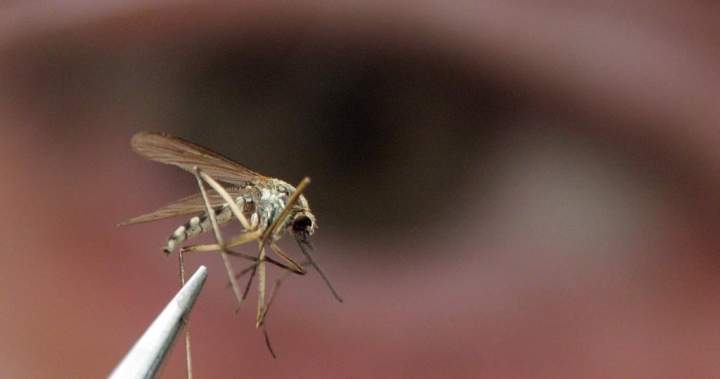West Nile virus has returned to Canada for another season, with detections in mosquitoes in multiple regions of Ontario in the past week, including in Toronto.
Niagara Region Public Health confirmed Tuesday that West Nile virus had been detected in mosquitoes in Welland, Ont., while Toronto and York Region reported their first positive cases in the insects late last week.
No human cases of the virus have been reported in Canada as of Wednesday, but that isn’t stopping health-care professionals from urging caution.
“Nobody wants to get bit by mosquitoes, whether or not they’re causing fever,” said Dr. Isaac Bogoch, an infectious diseases specialist at Toronto General Hospital.
West Nile virus first arrived in Canada in August 2002, according to Infection Prevention and Control Canada (IPAC).
IPAC says the virus primarily infects birds and is then spread to humans by mosquitoes that have fed on the blood of those birds.
Though no human cases have been reported in Canada so far this year, Bogoch said they are typically seen in mid- to late summer and into early fall.
In those that the virus does infect, about 70 to 80 per cent may not even realize they have it, as they will have no symptoms.

Get weekly health news
Receive the latest medical news and health information delivered to you every Sunday.
But those who do will typically experience symptoms like a fever, a headache, body aches, a mild rash and swollen lymph glands.
The symptoms usually appear within two to 15 days after infection.
The Public Health Agency of Canada says less than one per cent of people infected with the virus will develop severe symptoms and health effects.
PHAC says people 50 years and older, those with chronic diseases like cancer and heart disease, and those with weakened immune systems are at higher risk of severe symptoms.
In severe cases, people can face the rapid onset of a severe headache, a high fever, a stiff neck, nausea or vomiting, difficulty swallowing, drowsiness or confusion.
PHAC says loss of consciousness, lack of co-ordination, muscle weakness or paralysis are also possible in severe cases.
“Rarely it can cause neurologic manifestations and that can be more severe,” Bogoch said.
“It can cause inflammation of the brain, inflammation of the area around the brain and spinal cord, a meningitis-type picture, and then it can also rarely cause a paralysis-type syndrome that’s really reminiscent of polio.”
Canadian Family Physician, the official publication of the College of Family Physicians of Canada, notes that three to 15 per cent of those with severe illness can die.
“It’s extremely rare, but again it’s no laughing matter,” Bogoch said.
Mild cases typically take a week to recover, but PHAC says some severe cases could see a variety of health effects that could last months to years after illness.
People who develop symptoms of West Nile after being bitten by a mosquito are urged to see their health-care provider immediately.
The risk of becoming infected with West Nile virus starts in mid-April and lasts typically until the first hard frost in either late September or October.
The highest risk period for humans is between mid-July and early September, with mosquitoes often most active at dawn and dusk.
PHAC says when outside, people should cover exposed skin by wearing long pants and loose-fitting, long-sleeved shirts, socks and a hat. People should also wear light-coloured clothing, as PHAC notes mosquitoes are attracted to dark colours.
People are also encouraged to use insect repellents containing DEET or icaridin, which can also help prevent bites.
The health agency says Canadians can also take steps to reduce mosquitoes near their home, namely by getting rid of standing water around their home and putting screens on their windows and doors.
However, while West Nile can be a concern, Bogoch says it shouldn’t prevent Canadians from enjoying the summer, whether they’re at the beach, at a cottage or enjoying summer camp.
“We should be outside and enjoying it as much as possible, because winter is unfortunately around the corner as well,” he said. “But no reason to hide indoors because of this. Just go outside, have a wonderful time, be aware that they’re there.”
Read the full article here

















